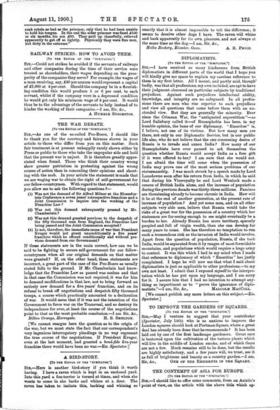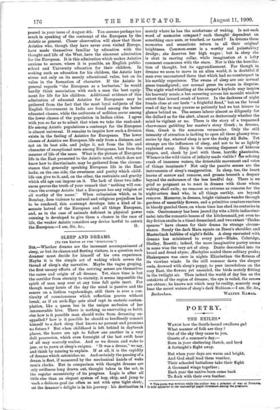THE CONTEMPT OF ASIA FOR EUROPE.
[To THE EDITOR OF THE "SPECTATOR."]
Sin,—I should like to offer some comments, from an Asiatic's point of view, on the article with the above title which ap- peared in your issue of August 4th. You assume perhaps too much in speaking of the contempt of the European by the Asiatic as general. Closer observation will show that those Asiatics who, though they have never even visited Europe, have made themselves familiar by education with the thought and life of the West, have the sincerest admiration for the European. It is this admiration which makes Asiatics anxious to secure, where it is possible, an English public- school and University education for their children. In seeking such an education for his children, the Asiatic lays stress not only on its merely educational value, but on its value in the formation of character. If the Asiatic in general regards "the European as a barbarian," he would hardly think association with such a man the best equip- ment for life for his children. Additional evidence of this admiration of educated Asiatics for Europeans may be gathered from the fact that the most loyal subjects of the English Government in India are found among the better educated classes, while the outbursts of sedition occur among the lower classes of the population in Indian cities. I agree with you so far as to admit that when we take the rank-and- file among Asiatic populations a contempt for the European is almost universal. It remains to inquire how such a division exists in the feeling of Asiatics for Europeans. The lower classes of Asiatics see European life only from a distance, and not on its best side, and judge it, not from the life and character of exceptional men among Europeans, but from the manner of life of the mass. What is the picture of European life in the East presented to the Asiatic mind, which does not know how to discriminate, may be gathered from the circum- stance that generally speaking European life in the East lacks, on the one side, the sweetness and purity which child- life can give to it, and, on the other, the restraints and gravity which old age can impose on it. The lack of these two influ- ences proves the truth of your remark that "nothing will con- vince the average Asiatic that a European has any religion at all worthy of the name." When submission which, as in Bombay, does violence to natural and religious prejudices has to be rendered, this contempt develops into a kind of in- sensate hatred of the European and all things European, and, as in the case of animals deficient in physical power cunning is developed to give them a chance in the race of life, the weaker Asiatic considers any device lawful to outwit the Enropean.—I am, Sir, G.



































 Previous page
Previous page